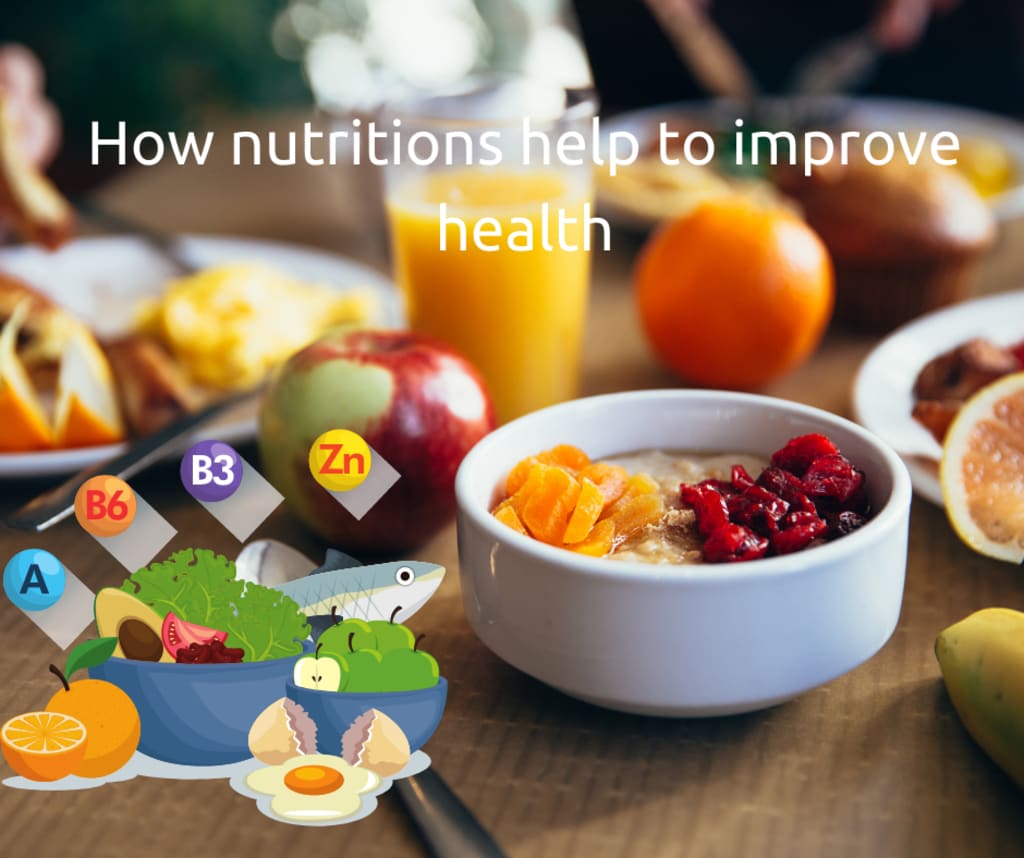The Nutrition food we need and how to improve our diet plan
How nutrition help to improve health

Cancer, diabetes, heart disease, mental disorders, and several other diseases can all be linked to diet—so choosing the right food can make a big difference in your health. Unfortunately, different diet experts often give conflicting advice on what we should and shouldn’t eat to have the healthiest diet possible. Here are some of the nutrients that most nutritionists agree we need more of in our diet plan, along with advice on how you can incorporate them into your daily meals to improve your health and longevity.
The power of Omega-3 fatty acids
Omega-3 fatty acids are essential nutrients, meaning they are crucial for your overall health. Omega-3s have been shown to boost cardiovascular health and reduce your risk of coronary heart disease. That's not all: Research also suggests omega-3s may help prevent depression, fight cancer, lower blood pressure, stabilize blood sugar, slow age-related cognitive decline, and even promote weight loss. To maximize these benefits while losing weight safely, try swapping out red meat for fish in your diet regularly—at least two servings per week is ideal. It’s easy to find omega-3s in seafood like salmon, tuna, and trout; many nuts (walnuts, pecans, and almonds); and some vegetables (broccoli, spinach, and Brussels sprouts). You can also get them from supplements if you don't eat enough of these foods regularly.
Magnesium: Vital to human growth, mood, and energy
Magnesium is a nutrient that’s involved in hundreds of processes in your body, from helping maintain healthy bones to supporting muscle function. Some research suggests that it can also help ease stress, reduce depression, and fight diabetes. Magnesium is also key for energy production; after all, it’s involved in producing ATP (adenosine triphosphate), which is what fuels every cell in your body. You probably don’t get enough of it—in fact, many people are deficient. How much magnesium you should be getting depends on age: For most adults, 400-420 milligrams daily works best; women who are pregnant or breastfeeding need more—about 310–360 milligrams per day. Foods rich in magnesium include dark leafy greens like spinach, chard, and kale; nuts like almonds, cashews, and peanuts; seeds like pumpkin seeds and sunflower seeds; beans such as navy beans, soybeans, and black beans; fish such as halibut, mackerel, and tuna; bananas, avocados, and figs.
Vitamin D - Are you getting enough?
Vitamin D is one of those nutrients that many of us are likely deficient in. And, that could be a bad thing. Evidence suggests Vitamin D helps reduce inflammation, fights off the infection, and supports bone health. What’s more, it could even prevent cancer! But, most people aren’t getting enough Vitamin D. If you want to know if you should be supplementing with Vitamin D and why supplementation isn’t enough check out The Dietitian’s Guide To Vitamin D (AAP 2016). Keep in mind that not everyone can safely take supplemental Vitamin D so speak with your physician before dosing up!
B vitamins: Not just for vegans anymore!
You might think of B vitamins as being only for vegetarians, but anyone who wants a healthy heart will benefit from these guys. They may help reduce blood pressure and homocysteine levels (this is an amino acid that’s linked with a high risk of heart disease). Some studies have also shown that they can help reduce depression symptoms, which makes them great for women! You’ll find B vitamins in eggs, fish, meat, and poultry. If you don’t eat meat or animal products or want to try a supplement instead, you can also find vitamin B supplements at your local health store.
Is gluten holding you back?
Gluten is a mixture of proteins found in grains such as wheat, rye, barley, spelled, Kamut, triticale, and other foods derived from these sources. It’s commonly used as a binding agent or filler in processed foods like cheese, meats (salami), soups (cream of wheat), frozen meals (TV dinners), and canned goods (peanut butter). Our bodies can’t digest gluten naturally so it passes through undigested. This can cause inflammation in some people with Celiac disease. If you’re trying to lose weight or overcome digestive issues, removing gluten from your diet may help you shed pounds quickly.
What about fiber?
Fiber is great for your body. High-fiber foods help you feel full, control blood sugar levels, balance hormones, and reduce inflammation. If you don’t get enough fiber, it can lead to constipation. The good news is that many fruits, vegetables, beans, and whole grains are high in fiber. A balanced diet typically includes 25 grams of fiber per day. Including more plant-based foods—like legumes, oats, nuts, and seeds—in your daily diet will help you reach your goal faster. Be certain to drink plenty of water as well. It helps move things along!
How does nutrition help to improve health?
Healthy eating is not a one size fits all type of thing. For example, some people find they are more sensitive to gluten, while others are more bothered by dairy. But, if you’re serious about improving your health, it’s helpful to build habits around a few key components of a healthy diet. One such component is protein—but what does it do? And what should you watch out for when adding it to your balanced meal plan? Consider these facts about protein:
- Protein plays a role in your immune system and may help ward off cancer
- Protein can help balance blood sugar levels
- Eating adequate amounts of protein may aid in weight loss.
To lose weight safely but quickly, switch to a protein-rich diet. This will ensure that you’re getting enough nutrition without going overboard on calories.
Inexpensive meals with high-protein content: While it’s true that protein comes from animal sources like meat, fish, eggs, and cheese, it also comes from plant sources like legumes (beans), lentils, and tofu. Some vegetables are even high in protein! Many plant proteins are considered incomplete proteins because they don't contain all nine essential amino acids; however, combining certain plant proteins with other foods can make them complete proteins.
Originally published in: ushealthcarecenter.com
About the Creator
Venkata Rambabu
I am a Content creator on Health and fitness.






Comments
There are no comments for this story
Be the first to respond and start the conversation.